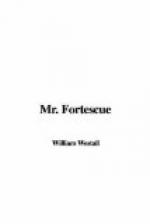“I ask no more, senor; and if you are fortunate enough to cure Mamcuna of her sickness—”
“Or make her believe that I have cured her.”
“That would do quite as well; you will thank me for bringing you to Pachatupec, for although the queen can make things very unpleasant for those who offend her, she can also make them very pleasant for those whom she likes. And now, senores, as we must to-morrow travel a long way fasting, let us turn into our hammocks and compose ourselves to sleep.”
Excellent advice, which I was only too glad to follow. But we were awake long before daylight—for albeit fatigue often acts as an anodyne, hunger is the enemy of repose—and at the first streak of dawn wended to the silent pool.
As we stepped into the canoe selected by Gondocori (the boats were intended for the transport of mules and horses) I found that the water was warm, and, on tasting it, I perceived a strong mineral flavor. The pool was a thermal spring, and its high temperature fully accounted for the fertility of the hollow and the mildness of the air. But how were we to get out of it? For look as I might, I could see no signs either of an outlet or a current. Gondocori, who acted as pilot, quickly solved the mystery. A buttress of rock, which in the distance looked like a part of the mass, screened the entrance to a narrow waterway. Down this waterway the cacique navigated the canoe. It ran in tortuous course between rocks so high that at times we could see nothing save a strip of purple sky, studded with stars. Here and there the channel widened out, and we caught a glimpse of the sun; and at an immeasurable height above us towered the nevados (snowy slopes) of the Cordillera.
The stream, if that can be called a stream which does not move, had many branches, and we could well believe, as Gondocori told us, that it was as easy to lose one’s self in this watery labyrinth as in a tropical forest. In all Pachatupec there were not ten men besides himself who could pilot a boat through its windings. He told us, also, that this was the only pass between the eastern and western Cordillera in that part of the Andes, that the journey from San Andrea to Pachatupec by any other route would be an affair not of days but of weeks. The water was always warm and never froze. Whence it came nobody could tell. Not from the melting of the snow, for snow-water was cold, and this was always warm, winter and summer. For his own part he thought its source was a spring, heated by volcanic fires, and many others thought the same. Its depth was unknown; he himself had tried to fathom it with the longest line he could find, yet had never succeeded in touching ground.
Meanwhile we were making good progress, sometimes paddling, sometimes poling (where the channel was narrow) and toward evening when, as I reckoned, we had travelled about sixty miles, we shot suddenly into a charming little lake with sylvan banks and a sandy beach.




